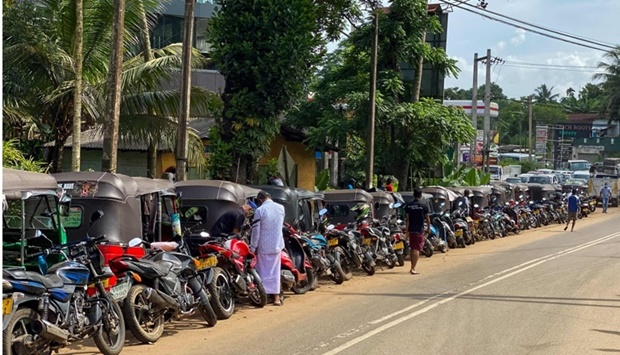Sri Lanka has virtually run out of petrol and diesel after several expected shipments were delayed indefinitely, the energy minister said Saturday while apologising to motorists for the worsening fuel crisis.
Kanchana Wijesekera said oil cargoes that were due last week did not turn up while those scheduled to arrive next week will also not reach Sri Lanka due to "banking" reasons.Sri Lanka is facing a serious shortage of foreign exchange to finance even the most essential imports, including food, fuel and medicines and is appealing for international handouts.

Vehicles queue for diesel and petrol as they wait for a bowser since yesterday, amid the country's economic crisis, in Colombo, Sri Lanka on June 23. REUTERS
Wijesekera said the state-run Ceylon Petroleum Corporation was unable to say when fresh oil supplies will be on the island. The CPC had also shut its only refinery over a shortage of crude oil, he added.
The refinery started operation earlier this month using 90,000 tonnes of Russian crude oil bought through Dubai-based Coral Energy on two-month credit terms.
Wijesekera said he regretted that deliveries of "petrol, diesel and crude oil shipments due earlier this week and next week" would not be fulfilled "on time for banking and logistical reasons".
Scarce supplies left in the country will be distributed through a handful of pumping stations, he said.
Public transport and power generation will be given priority, Wijesekera added, urging motorists not to queue up for fuel.
"I apologise for the delay and inconvenience," the minister said as hundreds of thousands of motorists spent long hours waiting for petrol and diesel across the impoverished nation.
Last week, the government shut non-essential state institutions along with schools for two weeks to reduce commuting because of the energy crisis.
Several hospitals across the country reported a sharp drop in the attendance of medical staff due to the fuel shortage.
Prime Minister Ranil Wickremesinghe warned parliament on Wednesday that the South Asian nation of 22 million people will continue to face hardships for a few more months and urged people to use fuel sparingly.
"Our economy has faced a complete collapse," Wickremesinghe said.
"We are now facing a far more serious situation beyond the mere shortages of fuel, gas, electricity and food."
Unable to repay its $51 billion foreign debt, the government declared it was defaulting in April and is negotiating with the International Monetary Fund for a possible bailout.

